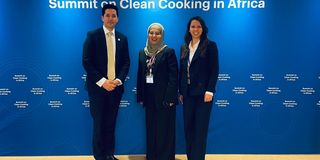Why Puma Energy excels with low-carbon and lasting solutions

From left are Puma Energy Global Head of Corporate Affairs and ESG Omar Zaafrani, Puma Energy Tanzania Managing Director Ms Fatma Abdallah and Puma Energy Global ESG Lead Ms Carina Schacherl in a group photo at the Summit on Clean Cooking in Africa.
What you need to know:
- As a direct result, we are today in a climate emergency. To avert catastrophe, we must now radically switch to a sustainable, net-zero future.
Dar es Salaam. Since the industrial revolution, fossil fuels have powered extraordinary growth and development, albeit with huge costs to our climate.
As a direct result, we are today in a climate emergency. To avert catastrophe, we must now radically switch to a sustainable, net-zero future.
This transition needs to happen fast, but it also must happen fairly and inclusively.
If done right, the transition offers immense opportunities: systems change in which all communities, workers, and countries are lifted.
The reality is that governments need partners. In the energy docket, Tanzania has Puma Energy Tanzania at the forefront of the initiative through its extensive supply of low-carbon energy solutions known from households to businesses.
Puma Energy Tanzania’s Managing Director Ms Fatma Abdallah held talks with the Citizen reporter concerning a just transition the company pushes and so much more. The following is a snippet of their conversation:
Qns:The intensifying climate emergency, ongoing energy crisis, and increasing political uncertainties worldwide must be the turning point to accelerate the energy transition. What’s your take on this agenda?
Ans: Climate change, along with supply disruptions stemming from price volatility, resource scarcity, and geopolitical tensions, frequently lead to instability in global energy supplies and shape energy policies worldwide.
These challenges, however, can also drive nations to pursue greater energy independence by developing local renewable energy projects, reducing reliance on sources that are subject to geopolitical uncertainties.
These factors underscore the urgent need for a swift transition to feasible renewable energy. It extends beyond mere technological advancements; it requires a holistic approach involving robust policy measures, economic incentives, international cooperation, and collaborations between government and industry.
However, the transition must be equitable, addressing the socio-economic impacts on communities and countries.
In doing so, the shift can promote global equity, support the objectives of sustainable development, and enhance environmental sustainability.
Puma Energy Tanzania views these challenges as opportunities in enabling the energy transition.
In line with governmental clean cooking strategies, we have broadened our operations to include the LPG sector (Pumagas) and initiatives in solar and CNG.
From a business perspective, this expansion not only drives growth but also positions us as a key player in addressing the ongoing energy and climate challenges.
Q: President Samia launched double initiatives of the African Women Clean Cooking Support Programme (AWCCSP) in 2023 at COP 28 in Dubai and the National Clean Cooking Strategy (2024 – 2034) to increase households that use clean cooking energy and protect women and the environment from the defective energy sources. What is Puma Energy’s comment on this? And how do you take part in this monumental journey that Dr Samia started?
A: Puma Energy Tanzania commends and supports President Samia’s launch of both initiatives. They align with our commitment to expanding and distributing LPG cylinders as part of our broader strategy to support sustainable energy solutions.
Recognizing the importance of clean cooking fuels in reducing environmental impact and improving public health, we aim to enhance the accessibility of LPG.
This initiative aligns with both global sustainability goals and reflects the company’s dedication to fostering energy security in Tanzania.
Q: To ensure the efficient use of Liquefied Petroleum Gas (LPG) and low-carbon energy to customers, how do you make sure that you supply energy products but also enlighten? How is your clean energy products portfolio trending?
A: At Puma Energy Tanzania, we go beyond product distribution; we also focus on education and raising awareness. Each of our cooking gas cylinders has a safety message to instruct users on the optimal use, how to maintain it, and maintenance.
We also engage directly with customers at all our points of sale to emphasize safety. Regarding the trends in our product portfolio, we are in line with our company’s mission of energizing communities. Customers love our Pumagas brand, indicating strong acceptance and growing demand.
Q: Tanzania has an extensive population in remote areas and is still bearing the brunt of carcinogenic effects from charcoal and wood in their households. What are you doing to help this sidelined world?
A: Puma Energy Tanzania is planning to undertake several initiatives to help address the health impacts of using charcoal and wood for cooking:
- Expansion of Clean Energy Access: We are committed to extending the availability of cleaner alternatives like LPG to remote areas to ensure access to affordable and safe cooking solutions.
- Educational Programs: Conduct educational campaigns to raise awareness about the health risks associated with traditional cooking methods and to promote the benefits of switching to cleaner alternatives.
- Community Engagement and Feedback: Engaging with community leaders and residents is key to our approach as it helps to tailor our solutions to be more effective and welcomed by these communities.
- Partnerships for Broader Impact: Collaborating with local governments, international donors, and other stakeholders is crucial to amplifying our impact as they can help pool resources, align objectives, and ensure that our efforts are part of a larger, coordinated approach to solving energy access issues in Tanzania.
Q: What benefits are gained when the customers use clean energy in general?
A: Benefits range from individual health improvements to global environmental impacts. Here are some key advantages:
a) Health improvements: Switching to renewable energy sources like solar, and wind, or lower carbon fuels such as LPG and biogas reduces exposure to harmful pollutants that are typically released from burning traditional fuels like wood and charcoal. This can help to reduce respiratory illnesses, cardiovascular diseases, and other health issues.
b) Economic savings: Although the initial setup costs can be high, using renewable energy and low-carbon fuels can be economically beneficial. The ongoing operational costs are often lower than conventional energy sources due to the reduced costs, and the increased efficiency of modern energy technologies.
c) Energy reliability and security: This is evident as they provide the opportunity for decentralized power generation, which can reduce dependency on imported fuels and vulnerability to global market fluctuations.
d) Environmental protection: Sources such as solar, wind, and hydroelectric power generate electricity without burning fossil fuels, thereby minimizing carbon dioxide and other harmful pollutants released into the atmosphere. This transition to ‘cleaner’ energy sources helps to mitigate air pollution, reduce the carbon footprint, and promote the sustainability of natural ecosystems.
e) Social and economic development: Easy accessibility can improve education (through better lighting and resources), enhance healthcare (through reliable power for medical facilities), and boost economic opportunities (through increased capacity for businesses and industries, especially in rural or undeveloped areas.
f) Support for innovation and job creation: Increased investments in renewable energy technologies foster innovation through research and development, encouraging local entrepreneurship and the creation of new business opportunities. Moreover, the deployment, operation, and maintenance of clean energy projects can generate a wide range of job opportunities, ranging from engineering and construction to technical support and administrative roles.
Q: Any plans for Puma Energy Tanzania that are meant to make it grow bigger and maximize its business profit margins?
A: We have a varied strategic approach that we are considering enhancing our presence in the Tanzania market across the following:
- Enhancement of energy portfolio: Puma Energy Tanzania is committed to broadening its energy portfolio by further expanding the rollout of solar projects, as well as continuing to drive our LPG business, which not only provides our customers with diverse energy options but also aligns our company with the global movement toward sustainability.
- Expansion into new markets: We are actively exploring opportunities in regions with growing energy demand and are working to expand our presence in both existing and new geographical areas as a key strategy for driving our growth in Tanzania.
- Customer-centric initiatives: We continue to refine our customer-centric solutions and flexible pricing models to improve customer satisfaction and loyalty, ultimately leading to an increase in sales volumes.
- Sustainability initiatives: We are committed to supporting sustainable socio-economic development through the reliable and safe supply of energy, whilst also helping to enable energy transition and advocating for environmental stewardship in alignment with stakeholder expectations.


